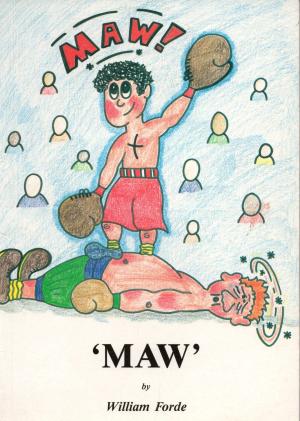| Author: | William Forde | ISBN: | 9781466083776 |
| Publisher: | William Forde | Publication: | February 8, 2012 |
| Imprint: | Smashwords Edition | Language: | English |
| Author: | William Forde |
| ISBN: | 9781466083776 |
| Publisher: | William Forde |
| Publication: | February 8, 2012 |
| Imprint: | Smashwords Edition |
| Language: | English |
The author’s works have been praised by numerous celebrities; the most notable being Nelson Mandela who described his African stories as ‘Wonderful’, the late Princess Diana who used to read the Douglas Dragon stories to the Princes William and Harry when they were aged 9 and 7 years, and a former Chief Inspector of Schools for Ofsted, who described the author’s writing to the press as being ‘High quality literature.’
As the founder of Anger Management in Great Britain during the early 70s, William Forde freely gave his anger management knowledge to the world and within a matter of a few years; ‘Anger Management’ groups mushroomed across the English speaking world. After founding the process of Anger Management, William Forde spent 25 years researching his work with both offenders and non-offenders, with aggressive and non-assertive response pattern types and with adults and young people who displayed ‘involuntary response patterns’ of excessive ‘anger’ or ‘fear’.
For 25 years, William Forde worked as a Probation Officer with The West Yorkshire Probation Service, during which time he operated his ‘Anger Management’ programmes in Probation Offices, Hostels, Hospitals, Prisons, Educational Establishments and Community Halls. His work in this area brought high success and national acclaim in his area of specialism.
By the time he retired as a Probation Office he had established a growing interest of working with children who displayed problems with Anger Management, along with difficulty in processing and expressing other emotionally disturbing emotions such as bereavement, loss, jealousy, bullying, and an inability to possess positive self-regard and love, etc. etc.
He became an author in 1989 and initially wrote books for young children that focused upon themes which involved dealing with the type of emotions his 25 years' experience as a Probation Officer had identified as creating emotional disturbance and inappropriate behavioural responses when not processed or healthily expressed. In short, he was using the medium of 'story telling' to openly and covertly acquaint his readership with ‘Anger Management’ principles and appropriate behavioural change.
From the many books that he has written for child, young person and adult, his most popular has been the Douglas the Dragon stories, which have been published and republished many times since 1990 and which the next King of England had read to him as a young boy by his mother.
Douglas the Dragon symbolises ‘The Power of Love’, which exists in all of us. There lives within the heart of every man, woman and child, two dragons: one is a ‘Dragon of Love’ and the other is a ‘Dragon of Anger’. Both dragons find it impossible to co-exist within the same heart and they are therefore in constant battle to be sole occupant and to control the thoughts, feelings and actions of the body they inhabit. If you want the ‘Dragon of Love’ to occupy your heart, you must evict the ‘Dragon of Anger’ from it. Only by putting ‘Anger’ out can one put ‘Love’ in! This previous sentence essentially represents the totality of 60+ years' learning for me! William Forde January 2012.
The five songs that accompany this musical play and their backing tracks can be freely downloaded from www.fordefables.co.uk/audio-downloads.
The author’s works have been praised by numerous celebrities; the most notable being Nelson Mandela who described his African stories as ‘Wonderful’, the late Princess Diana who used to read the Douglas Dragon stories to the Princes William and Harry when they were aged 9 and 7 years, and a former Chief Inspector of Schools for Ofsted, who described the author’s writing to the press as being ‘High quality literature.’
As the founder of Anger Management in Great Britain during the early 70s, William Forde freely gave his anger management knowledge to the world and within a matter of a few years; ‘Anger Management’ groups mushroomed across the English speaking world. After founding the process of Anger Management, William Forde spent 25 years researching his work with both offenders and non-offenders, with aggressive and non-assertive response pattern types and with adults and young people who displayed ‘involuntary response patterns’ of excessive ‘anger’ or ‘fear’.
For 25 years, William Forde worked as a Probation Officer with The West Yorkshire Probation Service, during which time he operated his ‘Anger Management’ programmes in Probation Offices, Hostels, Hospitals, Prisons, Educational Establishments and Community Halls. His work in this area brought high success and national acclaim in his area of specialism.
By the time he retired as a Probation Office he had established a growing interest of working with children who displayed problems with Anger Management, along with difficulty in processing and expressing other emotionally disturbing emotions such as bereavement, loss, jealousy, bullying, and an inability to possess positive self-regard and love, etc. etc.
He became an author in 1989 and initially wrote books for young children that focused upon themes which involved dealing with the type of emotions his 25 years' experience as a Probation Officer had identified as creating emotional disturbance and inappropriate behavioural responses when not processed or healthily expressed. In short, he was using the medium of 'story telling' to openly and covertly acquaint his readership with ‘Anger Management’ principles and appropriate behavioural change.
From the many books that he has written for child, young person and adult, his most popular has been the Douglas the Dragon stories, which have been published and republished many times since 1990 and which the next King of England had read to him as a young boy by his mother.
Douglas the Dragon symbolises ‘The Power of Love’, which exists in all of us. There lives within the heart of every man, woman and child, two dragons: one is a ‘Dragon of Love’ and the other is a ‘Dragon of Anger’. Both dragons find it impossible to co-exist within the same heart and they are therefore in constant battle to be sole occupant and to control the thoughts, feelings and actions of the body they inhabit. If you want the ‘Dragon of Love’ to occupy your heart, you must evict the ‘Dragon of Anger’ from it. Only by putting ‘Anger’ out can one put ‘Love’ in! This previous sentence essentially represents the totality of 60+ years' learning for me! William Forde January 2012.
The five songs that accompany this musical play and their backing tracks can be freely downloaded from www.fordefables.co.uk/audio-downloads.















